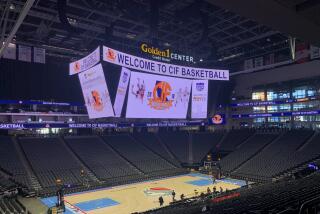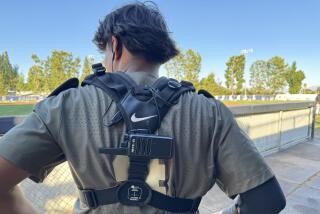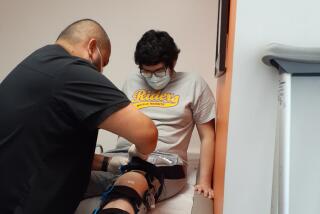Push On for Heart Screening
They consider themselves crusaders.
Members of A Heart for Sports, a Yorba Linda-based nonprofit organization that helps screen athletes for heart disorders, want to make heart screenings a standard part of physicals.
“My view is that [heart screenings] could be made a routine, like fluoridating the water,” said Robert Siegel, a cardiologist at Cedars-Sinai Medical Center and a member of the board of directors of A Heart for Sports. “They are cost-effective, because what’s the cost of one life?”
Skeptics are concerned that such procedures would be impractical and cost-prohibitive: Echocardiograms, the most effective tests for heart disorders in young athletes, can cost up to $1,000.
Rob Wigod, the Southern Section assistant commissioner who oversees football, pointed out that several football players who die from heart defects on the field would have died regardless of whether they played sports.
“A lot of those cases aren’t related to football,” Wigod said. “A kid could fall off his desk in English class because of a congenital defect.”
True, said Kevin Shannon, a pediatric cardiologist at UCLA Medical Center.
“But there’s a greater chance of [athletes] dying during athletic activities than sitting in English class,” Shannon said, “and a greater chance of them dying while playing high school football than basketball in their driveway.”
A Heart for Sports is aligned with a cadre of world-class cardiologists and manufacturers of portable ultrasound cardiac screening devices, and tests thousands of athletes each year free of charge.
Members said screenings could eventually become more widespread if hospitals affiliated with local high schools and colleges agreed to donate equipment and cardiologists’ time. Cardiologists from UCI Medical Center, for instance, will conduct free screenings next month at Edison Field.
While athletic officials applaud the efforts of those who propose mandatory heart screenings, they also view the additional testing as largely impractical.
Shannon said his biggest concern with screening for abnormal thickening of heart muscles is the number of false positives they would generate.
“Because athletes have conditioned hearts, they are borderline thick anyway,” he said.
“Far more children would be told they can’t participate than would be at risk for sudden death.”
The American Heart Assn., in a 1996 statement on screening for cardiovascular abnormalities in young athletes, echoed such concerns and does not recommend specialized heart tests on a widespread basis.
Seaneen Greaves, co-founder of A Heart for Sports, disagreed.
“There are a lot of false positives,” she said. “That’s why we advise and help direct family members to their own cardiologists for follow-up. [The cardiologist] would indicate whether there’s a legitimate risk involved.”
*
Free screenings will be available Sept. 8 for the first 1,000 college and high school athletes from Orange County from 9 a.m. to 3 p.m. Sept. 8 at Edison Field. Preregistration is required: (888) 509-4278.
More to Read
Sign up for Essential California
The most important California stories and recommendations in your inbox every morning.
You may occasionally receive promotional content from the Los Angeles Times.











